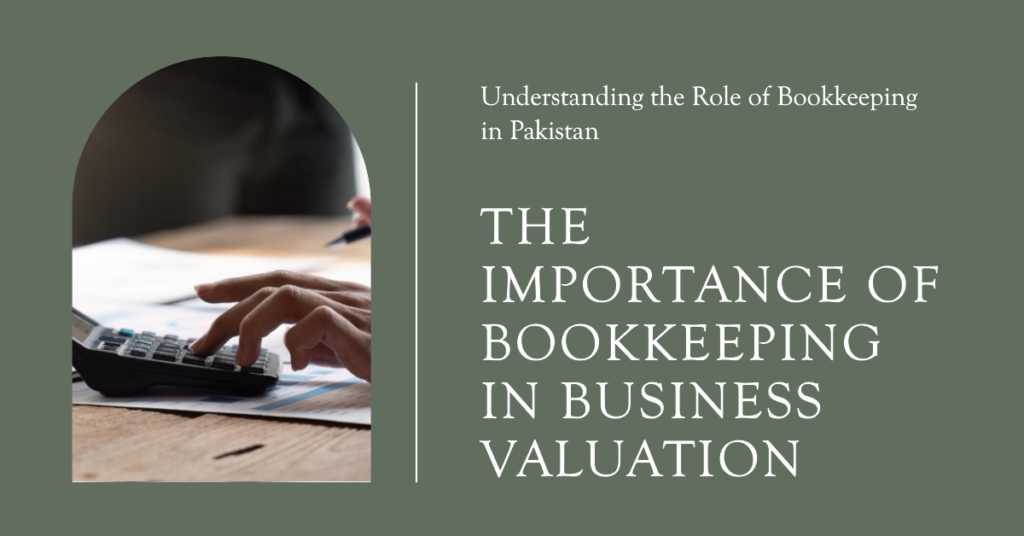Introduction:
Bookkeeping plays a crucial role in business valuation, as it provides the foundation for accurate financial reporting and analysis. In the context of Pakistan, where businesses operate within a dynamic and competitive environment, proper bookkeeping practices are essential for determining the value of a company. This article aims to explore the role of bookkeeping in business valuation in Pakistan, including definitions, examples, case studies, and a concluding remark.
Definitions:
Bookkeeping: Bookkeeping is the systematic recording, organizing, and tracking of financial transactions of a business. It involves maintaining accurate records of income, expenses, assets, liabilities, and equity.
Business Valuation: Business valuation is the process of determining the economic value of a company. It involves assessing various factors, including financial performance, assets, liabilities, market conditions, and future prospects, to estimate the worth of the business.
Role of Bookkeeping in Business Valuation:
Accurate Financial Records: Proper bookkeeping ensures the availability of accurate financial records, including income statements, balance sheets, cash flow statements, and other relevant reports. These records provide a clear picture of the company’s financial performance, which is essential for an accurate business valuation.
Analysis of Financial Ratios: Bookkeeping data allows for the calculation of key financial ratios, such as profitability ratios (e.g., gross profit margin, net profit margin), liquidity ratios (e.g., current ratio, quick ratio), and leverage ratios (e.g., debt-to-equity ratio). These ratios provide insights into the company’s financial health, profitability, and ability to meet its financial obligations. Such analyses are crucial components of business valuation methodologies.
Identification of Non-operating Items: Through proper bookkeeping, non-operating items, such as one-time expenses, extraordinary gains or losses, and non-recurring revenue, can be identified and adjusted. These adjustments help in normalizing the financial statements, allowing for a more accurate valuation of the core operations of the business.
Asset and Liability Assessment: Bookkeeping records enable a comprehensive assessment of a company’s assets and liabilities. This includes the valuation of tangible assets (e.g., property, plant, and equipment) and intangible assets (e.g., patents, trademarks), as well as the identification and valuation of liabilities (e.g., loans, outstanding payables). Properly valuing these elements is critical for determining the overall worth of the business.
Examples:
Example of Financial Ratios: By examining a company’s income statement and balance sheet, a bookkeeper can calculate the return on assets (ROA) ratio, which indicates how efficiently a company uses its assets to generate profit. This ratio provides insights into the company’s profitability and can influence its valuation.
Example of Non-operating Item Adjustment: If a company incurs a significant one-time expense, such as a legal settlement, proper bookkeeping ensures that this expense is appropriately recorded and adjusted when calculating the company’s earnings. Failing to account for such adjustments can result in an inaccurate valuation.
Case Studies:
XYZ Retail Store: XYZ Retail Store, a Pakistani business, implemented rigorous bookkeeping practices to maintain accurate financial records. During a valuation process, the bookkeeping data revealed a high level of inventory turnover, indicating the store’s effective management of inventory. This information positively influenced the business’s valuation as it demonstrated the company’s ability to generate sales and maintain healthy profit margins.
ABC Manufacturing Company: ABC Manufacturing Company in Pakistan diligently recorded its fixed assets, including machinery and equipment. During a business valuation, the accurate bookkeeping records facilitated an assessment of the company’s asset base, which significantly influenced the overall valuation. The valuation took into account the depreciation of these assets, ensuring a realistic reflection of the company’s worth.
Conclusion:
In the context of Pakistan, bookkeeping plays a vital role in business valuation by providing accurate financial records, enabling the analysis of financial ratios, identifying non-operating items, and facilitating the assessment of assets and liabilities. With proper bookkeeping practices, businesses can ensure the availability of reliable financial information necessary for accurate valuation. Examples and case studies highlight how bookkeeping influences the assessment of a company’s profitability, asset base, and overall financial health. By recognizing the significance of bookkeeping in business valuation, Pakistani businesses can make informed decisions, attract investors, and enhance their competitiveness in the marketplace.
